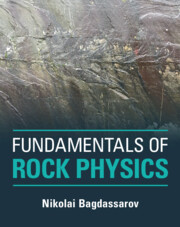Book contents
- Fundamentals of Rock Physics
- Fundamentals of Rock Physics
- Copyright page
- Dedication
- Contents
- Preface
- 1 Introduction
- 2 Density and Porosity
- 3 Stresses in Rocks
- 4 Mechanical Strain and Elastic Moduli
- 5 Permeability of Rocks
- 6 Mechanical Properties of Fluid-Bearing Rocks
- 7 Acoustic Properties of Rocks
- 8 Electric Resistivity
- 9 Dielectric Properties
- 10 Magnetic Properties of Rocks
- 11 Thermal Properties of Rocks and Minerals
- 12 Radioactive Properties of Rocks
- Index
- References
2 - Density and Porosity
Published online by Cambridge University Press: 19 November 2021
- Fundamentals of Rock Physics
- Fundamentals of Rock Physics
- Copyright page
- Dedication
- Contents
- Preface
- 1 Introduction
- 2 Density and Porosity
- 3 Stresses in Rocks
- 4 Mechanical Strain and Elastic Moduli
- 5 Permeability of Rocks
- 6 Mechanical Properties of Fluid-Bearing Rocks
- 7 Acoustic Properties of Rocks
- 8 Electric Resistivity
- 9 Dielectric Properties
- 10 Magnetic Properties of Rocks
- 11 Thermal Properties of Rocks and Minerals
- 12 Radioactive Properties of Rocks
- Index
- References
Summary
Two definitions of rock density are bulk density and solid matrix or skeleton density. Density depends on porosity, which is classified into open and closed porosity. Types of pores are defined by their interconnectivity, connectivity with surface, and geometry. Due to pore volume decrease with depth, sedimentary rocks possess three types of compressibility: bulk, matrix and pore volume compressibility. Density of rocks varies by density of constituting minerals and total porosity, and may be calculated as an arithmetic mean. Numerical modelling of rock densities may be done using Monte-Carlo simulations or on the basis of the software package Perple_X ’07. The capillary effect of fluid phase in pores depends on the wetting angle and specific surface energy. Drainage and imbibition are two processes that displace and saturate fluid in pores. Mercury porosimetry is a method to estimate pore volume by the intrusion of a nonwetting fluid. Gas-porosimetry relies on the known absorption of gas molecules on the pore surface, which is governed by the Gibbs equation. Kinetics of absorption/desorption processes are described by the Brunauer–Emmett–Teller (BET) equation. Focus Box 2.1: Models of porosity. Focus Box 2.2: Grain and atom arrangements in 3D. Focus Box 2.3: BET isotherm.
Keywords
- Type
- Chapter
- Information
- Fundamentals of Rock Physics , pp. 28 - 65Publisher: Cambridge University PressPrint publication year: 2021
References
Literature
- 3
- Cited by

